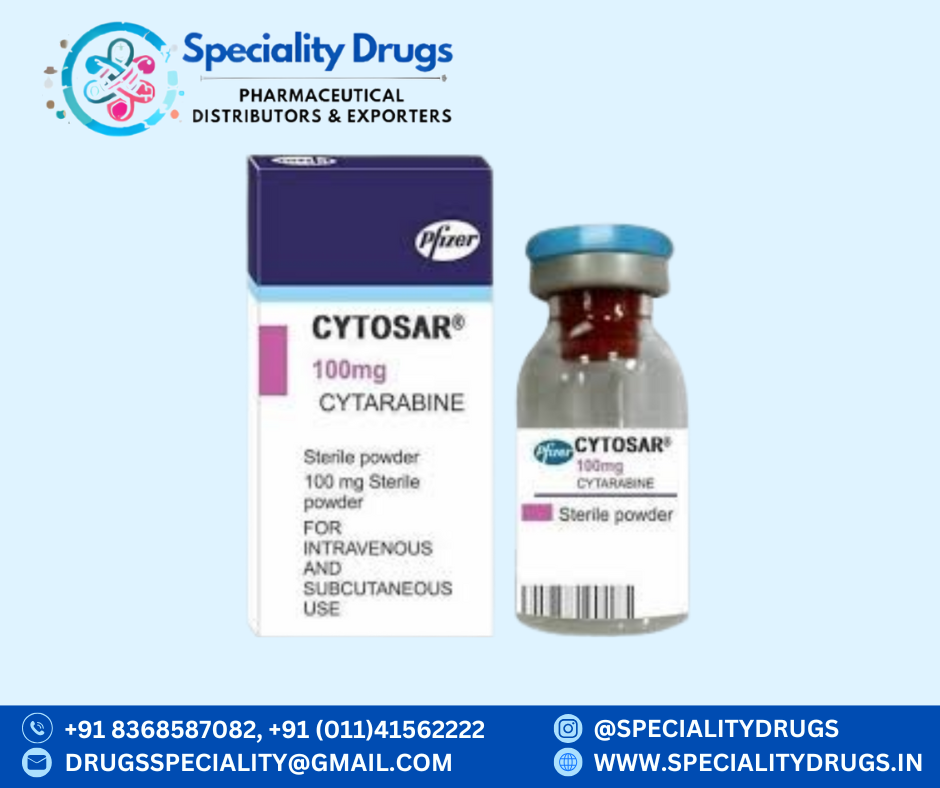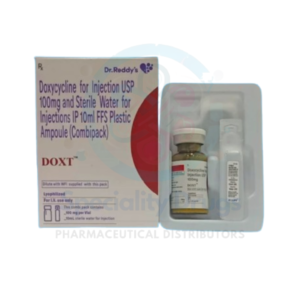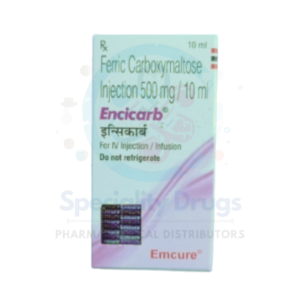What is CYTOSAR 100MG Injection?
CYTOSAR 100MG Injection contains Cytarabine, an antimetabolite chemotherapy medicine. It is used for the treatment of various blood cancers such as acute myeloid leukemia (AML), acute lymphocytic leukemia (ALL), and chronic myeloid leukemia (CML). It is given as an injection under the supervision of a healthcare professional.
What is the use of CYTOSAR 100MG Injection?
-
Treatment of acute myeloid leukemia (AML)
-
Treatment of acute lymphocytic leukemia (ALL)
-
Treatment of chronic myeloid leukemia (CML)
-
Management of meningeal leukemia (leukemia affecting the brain and spinal cord)
-
Sometimes used in combination with other anticancer drugs for more effective results
Benefits of CYTOSAR 100MG Injection:
-
Highly effective in slowing or stopping the growth of cancer cells
-
Reduces cancer cell multiplication and spread
-
Improves survival outcomes in leukemia patients
-
Can be combined with other chemotherapy drugs for enhanced efficacy
-
Used in both induction and maintenance therapy for leukemia
Side Effects of CYTOSAR 100MG Injection:
Like most chemotherapy medicines, CYTOSAR may cause side effects, including:
-
Nausea and vomiting
-
Loss of appetite
-
Mouth sores
-
Hair loss
-
Low blood cell count (risk of infections, anemia, or bleeding)
-
Diarrhea or abdominal pain
-
Fever and fatigue
-
Headache or dizziness
-
Liver function changes (rare but possible)
1. What is CYTOSAR 100MG Injection used for?
CYTOSAR 100MG Injection is used in the treatment of blood cancers such as acute myeloid leukemia (AML), acute lymphocytic leukemia (ALL), chronic myeloid leukemia (CML), and meningeal leukemia.
2. How does CYTOSAR 100MG Injection work?
It works by interfering with the DNA synthesis of cancer cells, stopping their growth and multiplication.
3. How is CYTOSAR 100MG Injection given?
It is administered as an injection into a vein (IV), under the skin (SC), or into the spinal cord (intrathecal), only by a healthcare professional.
4. Can I take CYTOSAR 100MG Injection at home?
No. This medicine should only be given in a hospital or clinical setup by trained doctors or nurses.
5. What are the common side effects of CYTOSAR 100MG?
Nausea, vomiting, mouth sores, diarrhea, low blood counts, fatigue, fever, and hair loss are common side effects.
6. Does CYTOSAR 100MG Injection affect the immune system?
Yes. It lowers white blood cell counts, which can increase the risk of infections.
7. Can CYTOSAR 100MG Injection be used during pregnancy?
No. It is unsafe in pregnancy as it can harm the unborn baby. Effective contraception should be used during treatment.
8. Can I breastfeed while on CYTOSAR?
No. Breastfeeding is not recommended during treatment as the drug may pass into breast milk and harm the baby.
9. How long does CYTOSAR 100MG stay in the body?
It depends on the dose and route of administration, but generally it is cleared from the body within a few hours. However, its effects on blood cells may last longer.
10. Is CYTOSAR 100MG Injection used alone or with other medicines?
It can be used alone or in combination with other chemotherapy drugs for better effectiveness.
11. What precautions should I take while receiving CYTOSAR?
-
Regular blood tests are necessary
-
Avoid crowded places or sick people to reduce infection risk
-
Inform your doctor if you develop fever, unusual bleeding, or persistent vomiting
12. Can CYTOSAR cause hair loss?
Yes. Temporary hair thinning or hair loss may occur but usually grows back after treatment ends.
13. Is it safe to drink alcohol during treatment with CYTOSAR?
It is best to avoid alcohol as it may increase liver-related side effects.
14. Can children be given CYTOSAR Injection?
Yes, but only under strict medical supervision, especially in pediatric leukemia cases.
15. How will my doctor monitor me during CYTOSAR treatment?
Your doctor will monitor your blood counts, liver and kidney function, and watch for any signs of infection or side effects during and after therapy.






Reviews
There are no reviews yet.